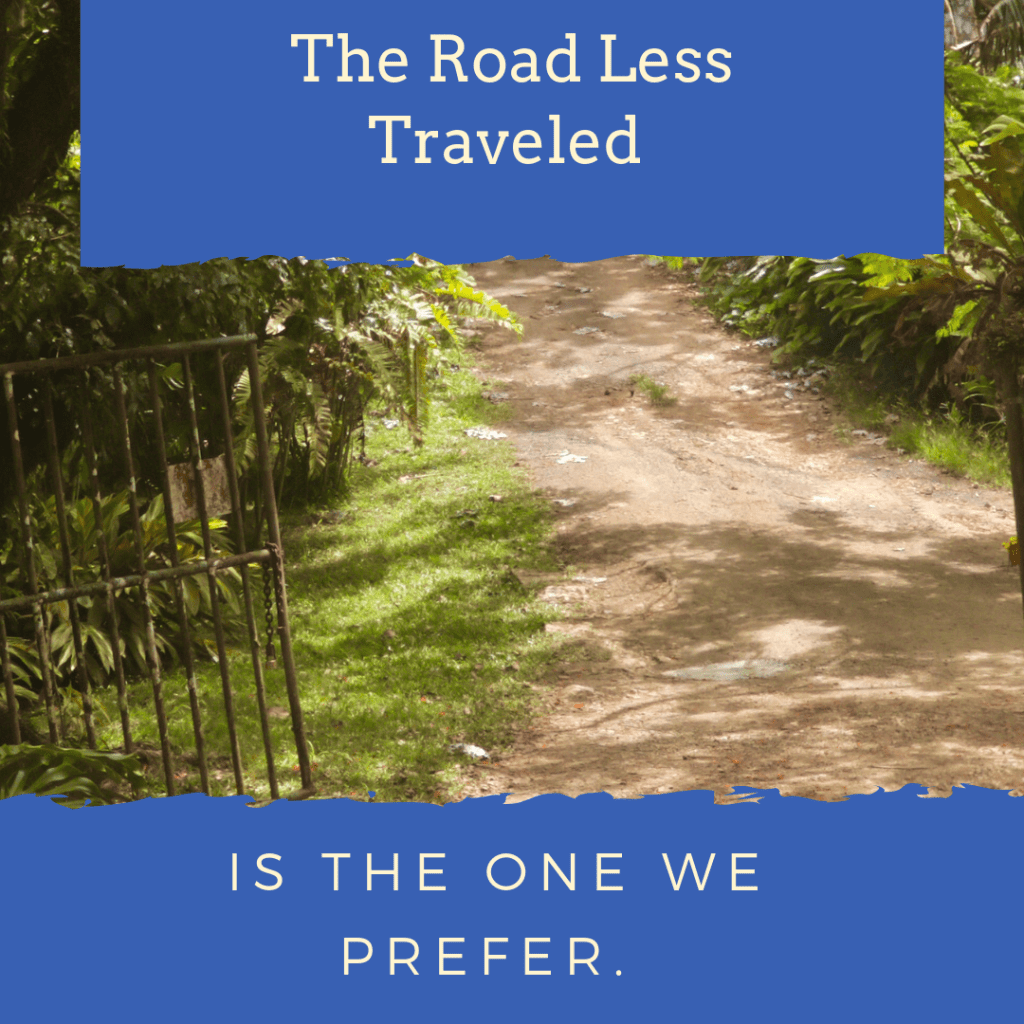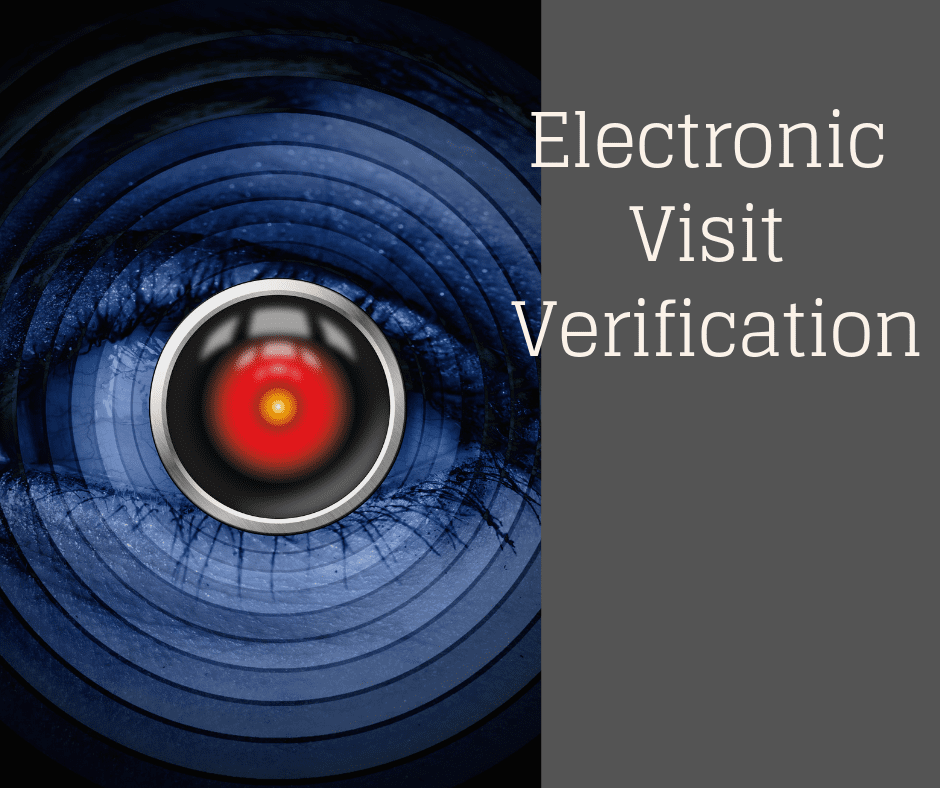I see the future before Mikelle and me as our little world splits in two. In my mind’s eye, I see Robert Frost, America’s poet, standing in the mid-summer sun. He holds a leather-bound notebook in his left hand, his right-hand shields his eyes as he peers through the sunlight viewing the crossroads which lay before him. He is dressed in a white shirt, bow tie and a soft linen suit.

The air is thick with summer heat, butterflies float, dragonflies dart from here to there as he ponders which road to take.
The road less traveled, of course. It is the road Mikelle and I have often taken. We prefer it and Mikelle has benefited from it.
But, it looks like we will be forced to take the other road and traverse down a darkened path into the shadowed and spooky forest of cloud computing, and data management and possible other intrusions into what was our relatively private and normal life.
Big brother’s eye looms in the shadows, peering into Mikelle’s home life and the lives of all that support her. And, we have no choice but to walk into the gloomy world of clock in and clock out. What is so bad about that? Let me enlighten you.

In order to receive Mikelle’s Medicaid waiver services, she and her team, when working with her, need to document all her activities for nearly twenty-four hours a day. We must clock in and clock out for personal care, health maintenance and homemaker services.
In the span of fifteen minutes, we could do all three of those services, clocking in and out for all of them.
For example, Mikelle calls out to me awakening at 6:45 am. I brush Ollie the cat sleeping soundly next to me on the pillow as I reach for my iPhone. I search through my apps and click on the Time2Care app, click three different tabs, clock in to personal care and head to her room to help her to the toilet. Technically, as she does her business, I need to clock out, then clock in to homemaking while making her bed. Once done, I clock out, then clock in to health maintenance to administer her CBD patches, pills and drops for her seizures, then clock out and clock in to her personal care, as she finishes her morning hygiene routine, then help her to her wheelchair, lift her into the chair, adjust her, place a blanket over her legs, comb her hair and place her glasses on her face. Then, clock out.
Once more I clock in to health maintenance as I prepare her morning vitamins and herbs, then clock out again, as I clock in to prepare her breakfast as personal care. If I need to assist her in eating, (if she had a seizure), I need to clock out of personal care and clock in to health maintenance. If she is good, then I clock out of personal care and clock in to homemaking as I clean up the kitchen.
This is what the federal government has in mind for families like ours. Fortunately, in other states which use facial recognition and GPS to verify work with the “client”, Colorado has chosen not to track Mikelle and her team. We are fortunate.
There is no choice. Electronic Visit Verification was inserted into the larger 21st Century Cures Act.
Our friends, Laurie and Emily are impacted much like us. Laurie and I met with Representative Diana DeGette’s office regarding the intrusion into our homes. When sponsoring the Cures Act, this impact falls into the “unintended consequences” section of the bill. They are attempting to change this portion, but do not have the support to move forward in amending the legislation.
It isn’t only the intrusion into our lives, it is the budgeting. In the last decade or so, budgeting has been easy. With EVV, budgeting must be done daily as we have three different services as listed above and five different wages paid to Mikelle’s team. The daily budget changes depending on who works and how many hours. EVV requires real-time clock in and clock out, so budgets change accordingly.
Hours used to be checked at the end of the pay period, now we use a complex Google Spreadsheet to manage the daily budget. No one set this up for us, we had to call on our community to help us out.
After attending countless stakeholder meetings, which had poor attendance by people with disabilities, Laurie and I met with our state officials, who are trying to make this new accountability measure to work for families. It isn’t that way in other states. Thank goodness we live in Colorado.
I know for a fact, in other states, caregivers have to take a picture of their client and this is without permission from the individual or their family. This did happen to us once and it was against Colorado policy. They did it anyway.
Here is what happened. Mikelle had been receiving massage services for several months when her provider stopped ten minutes short of her usual thirty-minute visit.
I asked her, “Why are you cutting the massage short?”
She replied. “We have a new system where I have to clock in and clock out. Apparently, the state is rolling out some new system. I need to complete contact notes while I am here rather than in the car.”
Then, she takes her iPad and snaps a photo of Mikelle to put in her notes.
“What are you doing?” I said.
“Oh, I have to take a picture of the client to prove I was here.” She said.
“You didn’t ask Mikelle if you could take her picture. And, frankly, I don’t want pictures of our home in some app that isn’t secure.”
“I am sorry. I have to do this according to my boss.” She said.
“I am going to call your boss. And, you are not to take pictures of Mikelle anymore.” I declared.
“I guess I could take a picture of the door showing your unit number.”
‘Brilliant.’ I thought. That door knocker looks the same every day. How does it prove you were here?
Ah, yes. “GPS. Your iPad shows you were here. So why do they need a photo?”
Long story short, I emailed the agency. They insisted they needed to take photos. I called our funder and the folks at the state. No need for pictures. It is not a requirement.
We fired the massage therapist and her agency.
Now, it may seem that I am a little paranoid. True, I am rather protective. But get this, Forbes magazine posted an article on Facebook regarding this administrations’ discussions with Social Security to monitor people with disabilities on social media. The intention is to determine if they are happy and thriving. If so—they probably don’t need Social Security.
Mikelle and I have always traversed “the road less traveled”. This Electronic Visit Verification nonsense has me tense. My shoulder’s creep up to my ears just thinking about it. I feel a volcano of anger rising up my spine and I won’t, we won’t go quietly down that darkened path.
Time to clock in.
POSTSCRIPT Laurie and I met with officials in Healthcare and Public Financing regarding our concerns about EVV. They assured us that there would be no GPS or BioMetrics used in Colorado. That is not the case with many providers and states. We will keep you posted.
